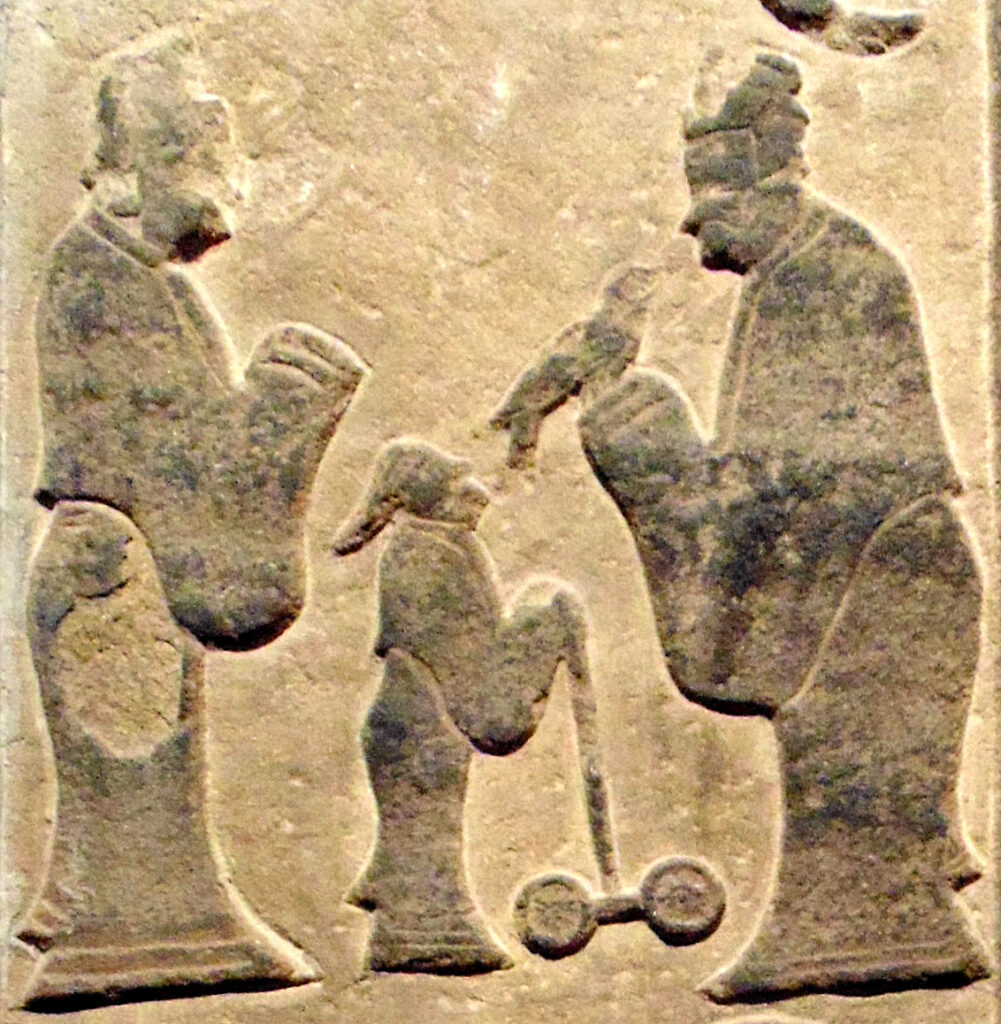
Unearthed in Suide county. Now in Beilin Museum, Xian
“Rather than draw by imitating as you are taught to do in school, ‘when you draw a tree, try to feel as though you start at the bottom and climb with it’” (Henri Matisse quoted by François Jullien in Vital Nourishment – Departing from Happiness Chapter 4).
From Shangdi to Heaven
The rulers of the Shang Dynasty had claimed that all things were created and controlled by a all-powerful monotheistic deity known as Shangdi (Lord Celestial). The rulers of the Zhou Dynasty that followed, however, had had to reinvent Shangdi as an impersonal “Heaven,” and claim that they had the “Mandate of Heaven.” When they, in turn, lost power, this impersonal “Heaven” collapsed as a theocratic system, leaving society with no overarching cosmology to maintain political and social order. In the 5th and 6th centuries BCE, sages such as Laozi and Confucius endeavoured to restore a framework which they based on empirical experience of natural processes, amounting to a sacralisation of the secular.
Zhuangzi distinguishes between two levels or regimes of vitality: one is the fundamental “heavenly” regime, the other is the reductively “human” regime
In the human regime, Jullien explains, “my vitality is ‘coerced’ and debilitated by all the prejudices that impinge on it, whether they stem from desire or knowledge.” The heavenly regime within me will be discovered “when my aims cease to get in the way,” and I will then be able to “feed’ it.” “Another way to represent the two regimes of reactivity is the following: on the one hand, when the ‘force’ that spurs me on (ji) is not well grounded or connected to the natural world process (but is instead limited to a superficial reaction dictated by my own point of view or desire and therefore weakly motivated), the expenditure of vitality within me is substantial; on the other hand, when the ‘force’ that incites me and gets me moving is the same one that keeps the world moving as a whole and connects me to its energy, the reaction that sets me in motion demands nothing while carrying me along and vitalizing me.” Jullien insists that “Zhuangzi neither morally condemns desire nor returns to an ascetic ethos; he merely observes that …when the stimulus (of desire) is strong, the incitement that connects me to the source of vitality itself comes through only weakly because it is attenuated by its stimulative trappings … By contrast, when the force animating life comes from the ‘heaven’ within me, that is, when I overcome my individual perspective and embrace the natural process, I no longer need my will (I am no longer reaching out toward anything). The world as a whole sets me in e-motion: it reacts through me and unfolds my path before me as it proceeds.”
A drunken man survives a fall because he is moved by processive reactivity alone
To illustrate what is meant to be “moved by processive reactivity alone,” Zhuangzi, brings up a concrete story based on “a simple experience: a drunken man falls from a carriage. What is it that allows this man to suffer injury rather than death when nothing about his physical constitution distinguishes him from others? The answer is that he climbs into the carriage without noticing and falls out the same way, and ‘because the fear of death does not penetrate his innermost recesses’, he is moved by processive reactivity alone, rather than affective reactivity. If it is true that the absence of affect in a state of drunkenness preserves us from injury and allows us to achieve an integrity of our whole being, then, Zhuangzi concludes, it is all the more true if we achieve such integrity with respect to ‘heaven’: ‘Because the Sage withdraws into heaven, nothing can do him harm’.”
The life of the sage, Zhuangzi says, coincides with the “course of heaven”
In Jullien’s words, this means that the sage “does not need to act by and for himself and therefore does not have to “force” the life that lives within him. At rest, he shares the virtue of the yin; in motion, he partakes of the spirit of the yang … when reactivity is at work in the world it suffuses his conduct and guides him directly. Or, put it differently, ‘when incited, he responds’, taking action only when he cannot do otherwise.” Recalling the “disturbing” similarity between the New Testament assertion that “he who loves life will lose it” and the Daoist statement that “one must renounce life if one wants to live it,” he mentioned in chapter 3, Jullien adds: “Echoing the ‘passivity’ of the creature opening itself up to divine grace (as in Christian Quietism, but without transcendence), the openness and passivity of the sage ‘embraces the coherence of heaven’ and vibrates in unison with it. Since he is in phase with this immanence, the effect comes of its own accord, and even without his knowledge, just as our organic functions usually operate without aim or intention.”
Engraver Qing chipped wood to make a bellstand
To become a sage, of course, “requires a vigorous unburdening.” Rather than drawing a Daoist equivalent of the Buddha’s Eightfold Path, Zhuangzi tells us another story: that of Qing, a carpenter (or engraver) who goes through the process of “unburdening” in order to make a bellstand:
“Engraver Qing chipped wood to make a bellstand. When the bellstand was finished viewers were amazed, as though it were daemonic, ghostly. The Marquis of Lu paid a visit and asked him.
‘By what secret did you make it?’
‘Your servant is a mere artisan, what secret could he have? However, there is one point. When I am going to make a bellstand I take care never to squander energy on it. I make sure to fast to still the heart. After fasting three days, I do not care to keep in mind congratulation and reward, honours and praise, my skill or clumsiness. After fasting seven days, I am so intent that I forget that I have a body and four limbs.
‘During this time my lord’s court does not exist for me. The dexterity for it concentrates, outside distractions melt away, and only then do I go into the mountain forest and observe the nature of the wood as Heaven makes it grow. The aptitude of the body attains its peak; only then do I have a complete vision of the bellstand, only then do I put my hand to it. Otherwise I give the whole thing up. So I join what is Heaven’s. Would this be the reason why the instrument seems daemonic?’ (Chuang-tzu, chapter 19 – translated by A C Graham).
Jullien comments: “In other words, he unburdens himself of everything that weighs him down and impedes the natural process responsible for the splendid growth of the tree. This thought is expressed phenomenologically and not psychologically: having completely unleashed his own capacity for growth, prior to all affect and intention, he immediately becomes complicit with the capacity for growth that the tree has revealed by rising so majestically. Henri Matisse offered an excellent commentary on this subject in his discussion of Chinese teaching: rather than draw by imitating as you are taught to do in school, ‘when you draw a tree, try to feel as though you start at the bottom and climb with it’.”
Source:
François Jullien – Vital Nourishment – Departing from Happiness (2007)
